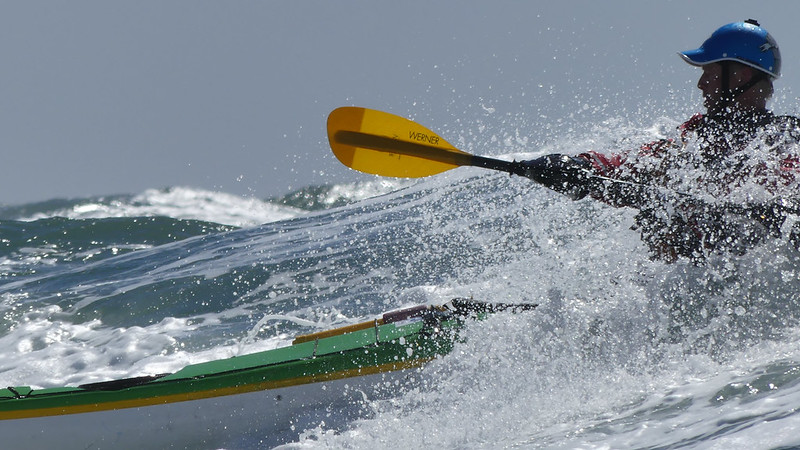Werner is a big player in the sea kayak paddle world, with a rich history and a huge range. From their large, high angle, foam core carbon Ikelos to their small, low angle, fiberglass reinforced nylon Skagit. If you are wondering which Werner blade would suit you best, read on for our complete guide to their current sea kayaking range.
Athena
RRP £500, Size 550cm2, Weight 613g
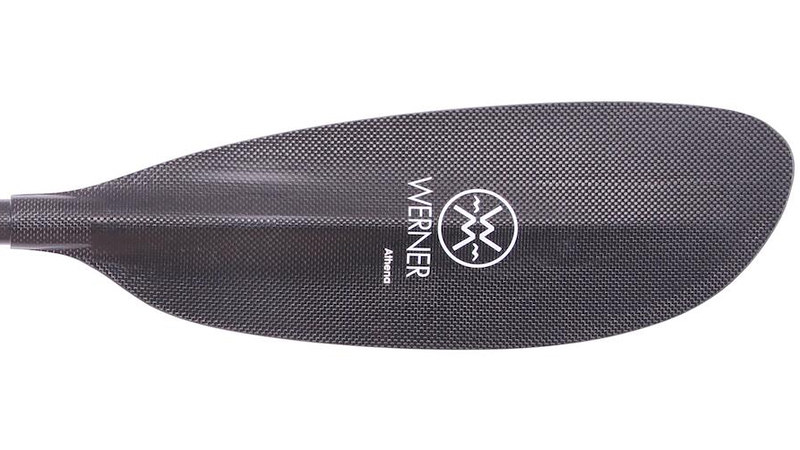
The Athena is Werners small and light blade. It’s long thin blade profile and high amount of dihedral is optimised for a low angle paddling style. Made using their lightest, most expensive and most fragile construction, which consisits of a carbon layup around a foam core. Its buoyant volume gives it a delightful lift out of the water as you paddle with it making even the return part of the stroke feel effortless. The blade is stable through the water from catch to release. Transitions are smooth and sculling and bracing support is good. The blade is well balanced and provides a great example of how foam core can benefit a low-angle touring paddle. Its fragility means you wouldn’t want to use the paddle around rocks and you would probably want to invest in a padded paddle bag. The Athena is suited to small to medium sized paddlers with large wallets, who use a low angle style for touring and those looking for maximum efficiency and minimum fatigue.
Little Dipper
Carbon RRP £380, Size 550cm2, Weight 613g
Glass RRP £300, Size 550cm2, Weight 762g
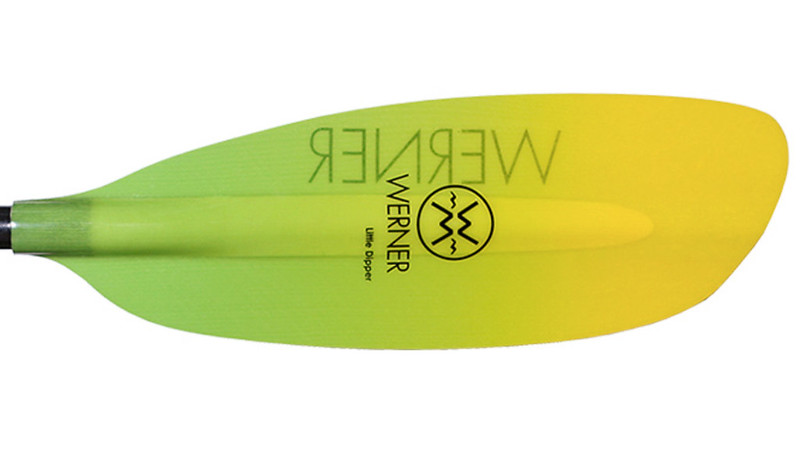
The Little Dipper is the same blade profile as the Athena but is made of more robust constructions. It is available in two layups, carbon or fibreglass. The latter being cheaper, more robust and available in a range of colours. The blade offers smooth transitions between strokes but provides less bouyant support while sculling and bracing than its foam cored sibling. The Little Dipper is suited to small to medium paddlers who use a low angle style for touring and for those looking for a balance between strength, weight and cost in their blades.
Skagit
Nylon Carbon RRP £260, Size 605cm2, Weight 861g
Nylon Glass RRP £190, Size 605cm2, Weight 953g
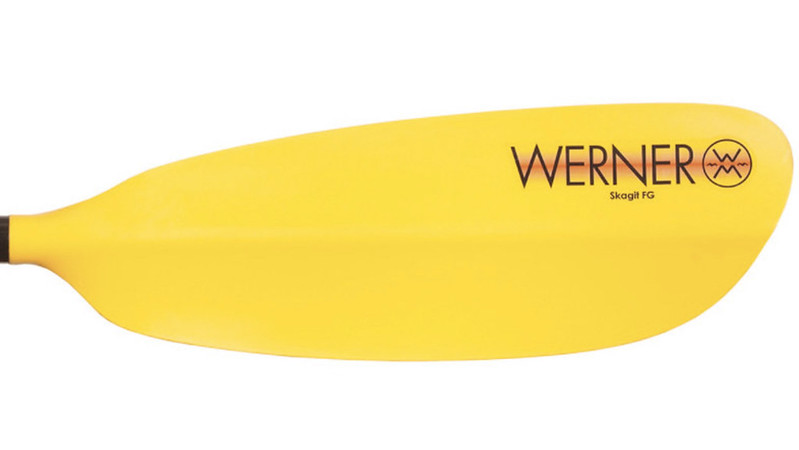
The Skagit is the budget version of the small, low angle blades. Made of injection moulded nylon reinforced with either carbon or fiberglass. It is the most robust but heaviest type of construction in the range. Its long thin profile is very similar to the previous blades but does come out slightly larger providing a more powerful stroke. This combined with the weight mean the blade doesn’t provide as much of the efficiency and low impact that a low angle paddle could. The Skagit is suited to medium sized paddlers who use a low angle style for touring and are looking for cheaper and more robust blades.
Kalliste
RRP £500, Size 643cm2, Weight 634g
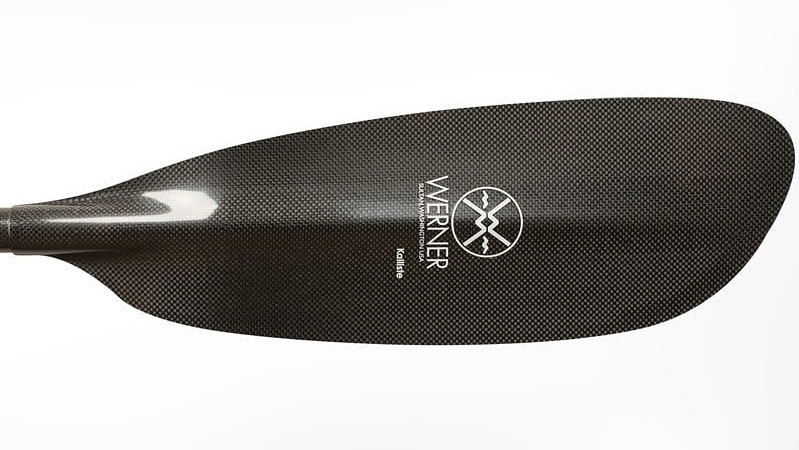
The Kalliste is a medium sized, low angle, lightweight blade. Made using Werners ‘Ultimate’ construction, carbon with a foam core, it is very light for its size. Like the Athena its volume gives it a buoyancy in the water, however because it is a larger blade size the bouyancy bouyancy is greater and as such requires a slightly firmer grip on the paddle. Its fragility means you wouldn’t want to use it too close to rocks and extra care would be needed when transporting it. The Kalliste is suited to larger paddlers who are fit and who use a low angle style for touring; and for those looking for a bit more power from a lightweight blade.
Camano
Carbon RRP £440, Size 650cm2, Weight 710g
Glass RRP £350, Size 650cm2, Weight 843g
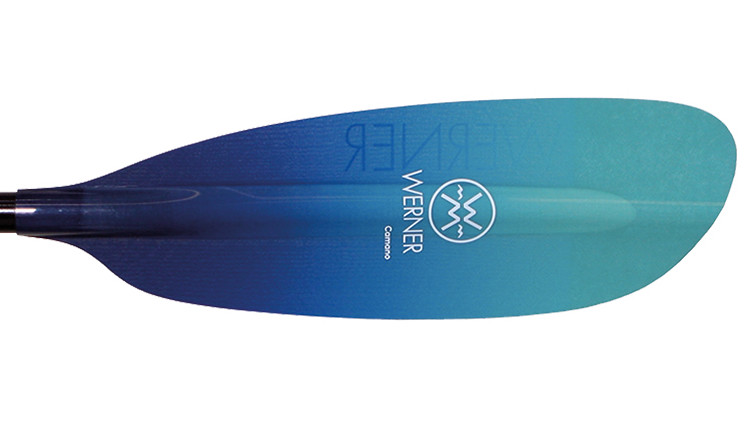
The Camano is a simmilar shape to the Kalliste but very slightly larger and made more durable using either carbon or fibreglass. Both these constructions provide a more middle ground balance between weight, cost and impact resistance. The blade offers a sturdy catch with sustained power and no flutter throughout the stroke. The blade area provides plenty of support for sculling and bracing while remaining nicely balanced for efficiency on those long paddles. The Camano is suited to larger paddlers who are fit and use a low angle style for touring; and for those looking for a bit more power from an efficient blade with a balance of strength, weight and cost.
Cyprus
RRP £500, Size 610cm2, Weight 634g
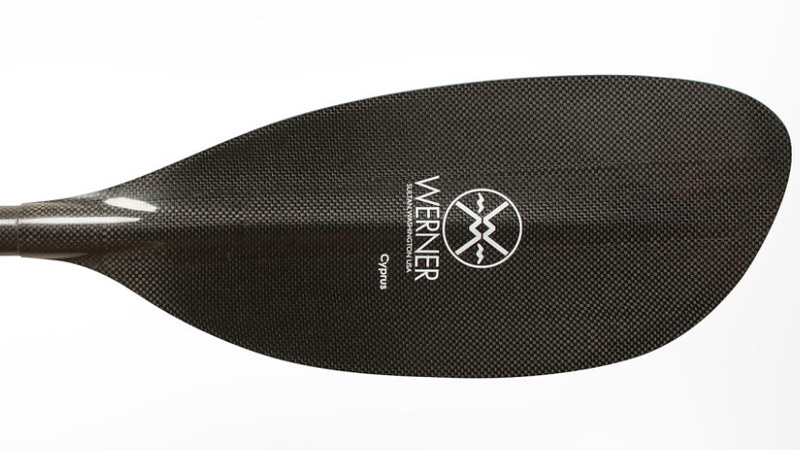
The Cyprus is Werners small, high angle blade, in their lightest construction; the ‘Ultimate’, carbon with a foam core. The Cyprus provides a power that defies its small blade size. This is primarily down to the width of the blade as it enters the water at the catch, and secondarily down to the lower angle of dihedral that Werner employ on all their high angle range. The rest of the stroke is smooth and stable, with the effortless lift that the bouyancy provides helping to release the blade at the end of the stroke. It delivers smooth transitions and solid braces, all in a very lightweight package. This lightness however makes it vulnerable to the risk of impacts. The Cyprus is suited to small to medium sized paddlers who want the performance and can provide the power required of a high angle stroke, in a lightweight paddle.
Shuna
Carbon RRP £440, Size 615cm2, Weight 673g
Glass RRP £350, Size 615cm2, Weight 782g
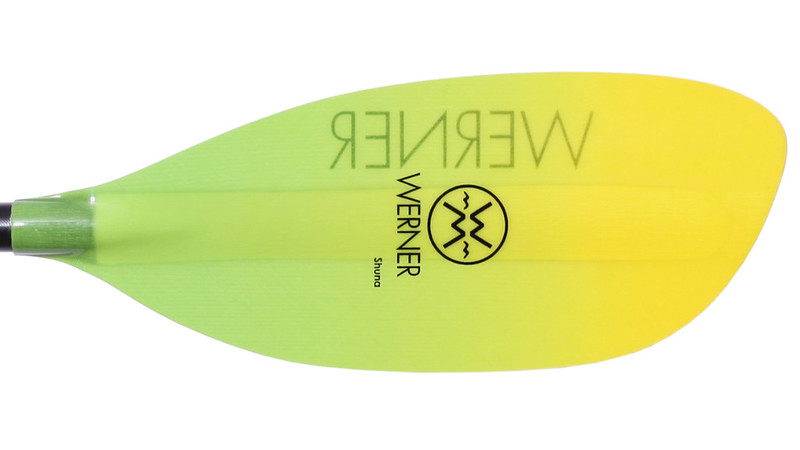
The Shuna shares almost exactly the same profile of the Cyprus but does come out slightly larger. It is constructed without the foam core and in a more robust carbon or fibreglass layup. In this blades case this translates to all the same qualities of the stroke, from a firm catch to a smooth and stable power phase, but without the paddle lifting itself out at the end of the stroke. The robust layup makes it ideally suited to the rugged demands of the oceans playgrounds, around rocks and in waves. The Shuna is suited to small to medium sized paddlers who want the performance and can provide the power required of a high angle stroke, with a robust blade.
Tybee
Nylon Carbon RRP £260, Size 608cm2, Weight 918g
Nylon Glass RRP £190, Size 608cm2, Weight 1091g
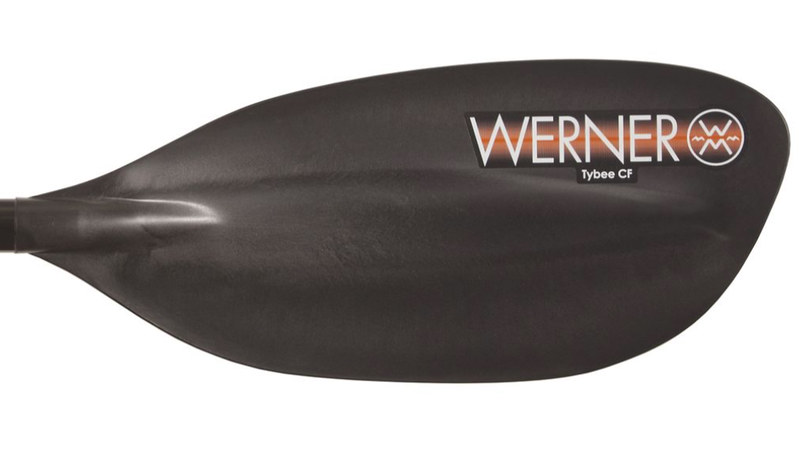
The Tybee is Werners budget version of their small, high angle blade. It provides the power and stability of the other paddles in that range but in a less flamboyant and more functional package. Made of injection moulded nylon reinforced with either carbon or fiberglass. It is the most rugged and heaviest construction type in the range. For those who often find themselves fending of rocks with their paddle it is reassuringly rugged. The Tybee is suited to small to medium sized paddlers who want the performance and can provide the power required of a high angle stroke, with a tough blade.
Ikelos
RRP £500, Size 691cm2, Weight 670g
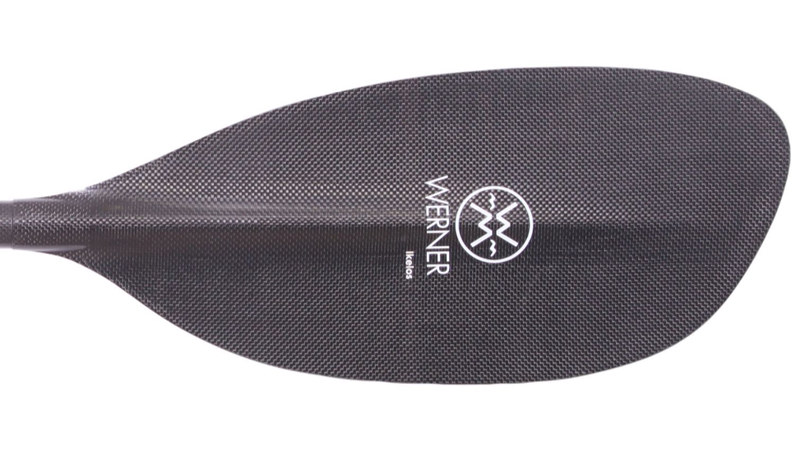
The Ikelos is Werners large and light, high angle blade. Made of carbon with a foam core, its large blade area and bouyancy make it fantastic for bracing and rolling. It has a very positive catch and the power and stability of the blade gives a reliable and powerful stroke. However it takes some muscle to swing a big blade like this all day long. Anyone other than a large and strong paddler should consider a smaller blade for the sake of their wrists, elbows and shoulders. The high buoyancy does try hard to lift the paddle out of the water during the stroke but the use of a vertical stroke and a large and powerful paddler counters this. The Ikelos is suited to large, strong and skilled paddlers who can provide the performance and care that this lightweight but powerful paddle provides.
Corryvreckan
Carbon RRP £440, Size 721cm2, Weight 776g
Glass RRP £350, Size 721cm2, Weight 827g
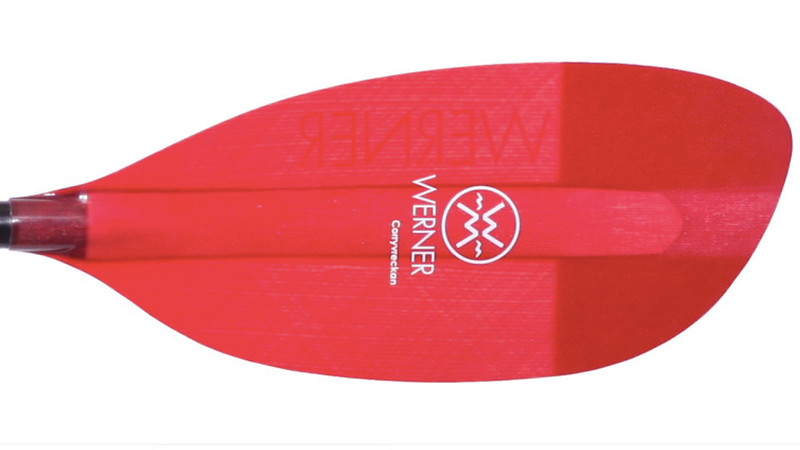
The Corryvreckan is a similar shape to the Ikelos but it comes up slightly larger and is made in either carbon or fibreglass, but without the foam core. These layups don’t make for quite as robust a blade as their smaller bladed models due to the wider area of blade they have to support but they are more than strong enough. Like the Ikelos it takes plenty of power to move the Corryvrechan through the water and it provides considerable purchase with any type of stroke. The Corryvreckan is suited to large and strong paddlers who can provide the performance that this powerful paddle provides.
Suggested reading:
- Sea kayaking safely: An interview with Nigel Dennis
- What’s best for base layers: Synthetic or natural?
- Calling for help: Devices for sea kayakers

By Philip Clegg
With two decades of working in the sea kayaking industry, Phil can be found on a daily basis coaching and paddling on the coastline of Anglesey. That’s when he’s not travelling the world expeditioning, coaching and testing kit.
